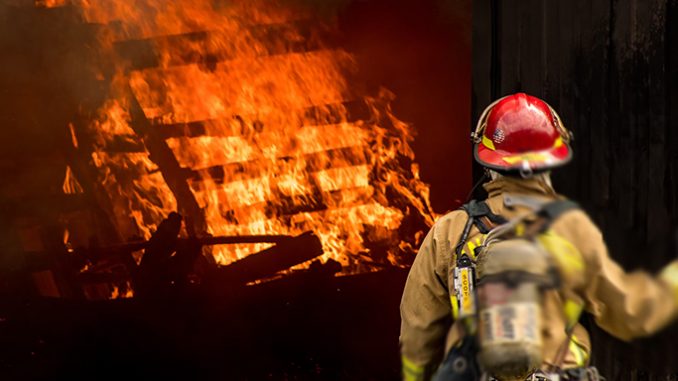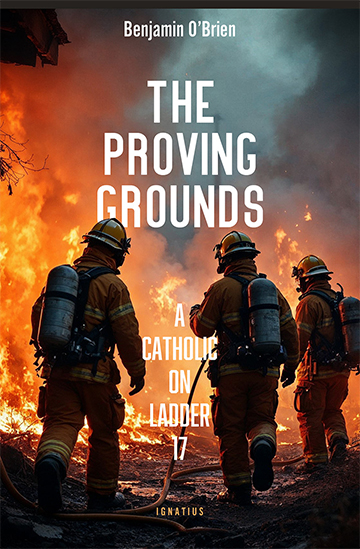
Benjamin O’Brien is the author of The Proving Grounds: A Catholic on Ladder 17 (Ignatius Press, 2025), a memoir of a rookie firefighter who struggles to overcome the challenges of his dangerous job while growing in the Catholic Faith. His story is filled with dramatic turns, heartache, and stories of triumph. These are stories within a story, daily life in a fire station and with a young family, as the author strives to grow in holiness, grow in his faith in Christ, and make sense of the beautiful and traumatic in this world.
O’Brien recently spoke with Catholic World Report about his new book, the role memoirs can play in evangelization, and authentic Christian masculinity.
Catholic World Report: How did the book come about?
Benjamin O’Brien: The credit goes to my wife, Katelyn. She is the one who said, “You should really write a book.” At the time, I didn’t think I’d stand a chance of getting published, but I took a leap of faith, and here we are.
The project had humble beginnings. I was five years on the job as a firefighter and had just worked a high-rise fire in which a resident lost his life. In reflecting on the incident and analyzing my own job performance, I decided to write it all down. The result was what is now the opening chapter of the novel. After reading it, my wife encouraged me to write some more, and so the book began to unfold.
At first, it was merely a collection of memories put down on paper, but as I looked more deeply into my own experiences, it became impossible to tell the story without a serious examination of the role that my Catholic faith has played in my career. As I wrote, I felt the need to retell the several occasions where secular agendas collided with faith. These conflicts gave me material for a good portion of the book, where I explore such issues as pornography in the workplace, the LGBT agenda, vaccine mandates, hostile coworkers, and the challenges of keeping one’s faith in a secular environment.
Firefighting thus became a vehicle for the more urgent questions facing a Catholic worker in the modern world.
CWR: Memoirs can be entertaining reads, but even better when they offer something of substance to the reader. Ahat is it about your own story that will do the reader good? What can they learn from you?
O’Brien: I was about halfway through writing the book when I realized that the whole point should not merely be to tell my story—a sophisticated exercise in navel gazing—but to help other Christians in similar circumstances. It can feel very isolating to be the only believer in one’s workplace.
I was often tempted to think that I was the crazy one. I felt so different from everyone else at times because of my beliefs, my morality. Yet there is positive encouragement in knowing that we are not alone, that there are other believers out there who are also trying to stay true to their faith and going against the tide. And so I began to tackle some of the tough issues, to give my readers encouragement, as well as something to think about.
Storytelling is a powerful way to convey truth, and rather than getting on a soapbox, I tried to allow my personal experiences to speak for themselves. This involved a lot of soul searching and honesty about what really happened, especially in acknowledging that I had been bullied. At first, I was reticent to write about some of my more painful interactions with coworkers, but I also began to recognize how important this was, not only for my own mental processing, but for anyone undergoing similar experiences. I wanted to equip other Christians with the tools to engage successfully in apologetics, to handle bullies, and not to be intimidated or discouraged by hostile encounters. I also took care to highlight some of my mistakes, not only to serve as a warning, but also to show that we don’t have to be perfect.
As Mother Theresa famously said, “God doesn’t call us to be successful, he calls us to be faithful.” We may need to muddle through and figure things out, but if we keep moving forward, learning and trying our best, He will take care of us, even if the journey is difficult and purifying sometimes.
CWR: You discuss the sort of “manly man” atmosphere at the fire station, and how you were mocked and ridiculed because you tried to avoid impure entertainment. This is pretty common in our culture these days. Why is there such a prevalence of this ugly form of “manhood”?
O’Brien: Without God, we lose our identity. I think many men are confused and searching for an identity, a masculine ethos, and trying to find it in all the wrong places. Our society offers many counterfeit identities, and this can induce many to assume a “macho” type of masculinity, which, unlike true strength, true manhood, actually involves domineering and sexually permissive behaviors.
Much of it goes back to the sexual revolution. We are living in the moral confusion that has followed in its wake, and many people simply accept and live out the moral standards of our times. Treating women as objects, viewing pornography, cohabitation before marriage, and homosexual activity are all examples of things that are seen as acceptable, even healthy.
Anyone who doesn’t go with the flow or at least condone these behaviors can quickly get labeled as a prude.
CWR: And how can we fight against that and promote an authentic Christian masculinity?
O’Brien: We may not be able to change the culture overnight, but I believe that each of us, in his own small way, is called to make changes within his sphere of influence. I think we’re beginning to see this more and more. Recently, Christian athletes have refused to participate in “gay pride” ceremonies, for instance. People of faith in the public eye are becoming more bold, in some cases, about their beliefs.
Maybe it won’t be something so dramatic, but it could be as simple as saying “no” to a coworker who wants to show an inappropriate image on their phone, or walking out when the conversation turns raunchy. People will get the message. It’s not about being cold or stand-offish. We should always try to be on the best of terms with our friends and coworkers, to be a warm, friendly presence whenever possible. But there also have to be certain lines that we will not cross, even if it means losing the credibility and respect of our peers.
Ultimately, changing the world has to start with my own personal conversion. I really have very little control over the person next to me, but I can try to master myself, work toward greater chastity, be a better husband, father, worker, and friend. That’s where the true battleground lies, in my own heart and mind and choices.
We can look to the Church herself to find examples of authentic masculinity. Men need brotherhood and accountability, and it is important to surround ourselves with good friends, men who can mentor us and inspire us to be virtuous. I have had the privilege of attending That Man Is You, a Catholic men’s program that is becoming popular in parishes across the United States, and I find it a great source of inspiration.
Also, as a Knight of Columbus, I have drawn a lot of encouragement from being surrounded by a Catholic brotherhood that promotes an authentic masculinity grounded in Christian morality. I would encourage men at any stage in their lives to join a similar group, especially when they are not getting a healthy comradeship at work.
CWR: In your work, you dealt with a lot of suffering, including seeing people losing their homes and belongings, their businesses, their loved ones, and all unexpectedly. Have you ever battled with the question of how a good God can let such bad things happen?
O’Brien: I think this question really came home to me when I was working a motor vehicle collision in which a child was injured. What struck me the most was that the child was the same age as my daughter; in fact, I was going home right after shift change to celebrate her birthday. The accident involved a difficult custody situation and a parent driving under the influence of drugs, and I felt myself reacting on an emotional level I hadn’t experienced before.
For me, it was both a challenge and a warning. I realized that it was incumbent on me, as a husband and father, to keep my own family together and never to let my own selfish choices lead them into a situation like the one I was seeing. It is painful to see where a life without God can lead, where my own free will could lead, if I make the wrong choices. God’s laws are given for a reason: to protect us from ourselves and to protect our little ones. I felt all this so strongly that night, and I touch on it a little in my book. It was not so much a question of “how could God want this to happen?” He doesn’t want it to happen. The question is, am I going to let this kind of thing happen in my life, contrary to his will, and when I see it in the lives of others, what am I going to do about it? Do I respond with compassion and a helping hand, or with judgment or indifference?
My turn came to wrestle with, “How could God let this happen?” when I made my first professional mistakes. When I made an error at a fire, in training, or driving the fire truck and earned the ridicule of my crew, the reaction that often bubbled to the surface was, “Why did you let me do that, God? I’m their only encounter with a Catholic! Shouldn’t I be an all-around shining example? How are they going to be drawn to the church if I make stupid mistakes?”
Looking back, I can see that He was stripping me of my pride. Being Catholic doesn’t make me better than anyone. I have to learn my job, overcome my shortcomings, and grow my skill set just like everyone else. We have a saying in the fire service: “It’s not the mistakes you make but how you recover from them that determines your character.” I think this rings true. Life in the emergency services brings you face to face with your limitations very quickly.
However, our weaknesses don’t take anything away from God’s goodness; in fact, they can be an opportunity to grow in trust.
CWR: As a husband and father, was it difficult to face such dangerous work? Did your faith give you a lens through which to view this question?
O’Brien: Firefighting can be dangerous, to be sure, but I think honestly that aspect bothered my family more than it bothered me. Firefighters like to joke about how you can’t both grow up and be a firefighter. There is always something of the little kid in the people who are drawn to big red trucks and sirens, and danger. At the same time, there is that thought in the back of your mind when you report for duty: I might not make it home this time. Firefighters don’t often talk about it, but it’s there.
My faith gave me an underlying peace about the possibility, knowing that, whatever happened, God would take care of my family. That doesn’t mean being irresponsible or taking unnecessary risks, but when you’ve done everything you can, trained hard, followed safety protocols, and taken out that life insurance policy, there’s a point at which you realize you’ve done everything you can and that the rest is in God’s hands. Being in the state of grace, of course, is always hugely important. There is a heightened sense of peace that comes with walking into the fire station, having just come from Confession and receiving Communion.
The lifestyle was tough on my family, though. When I was a rookie in fire academy, one of our training officers warned us that firefighting is “very hard on relationships.” I think anyone who has worked in the emergency services, whether police, fire, or ambulance, can attest to that. Service careers are highly stressful and demand a huge amount of mental energy and dedication, which can result in a tug-of-war between work and home life. I think this dynamic is especially hard on the wives. Men often shut off emotionally to deal with the stress and trauma, which hurts their spouses. We see high divorce rates in these professions.
I think, for Katelyn and me, our faith was the glue that held us together during those years. Our story isn’t over, by any means, and we are as in need of God’s help as ever to have a successful marriage, but I thank God every day for my wife, and for the love that he’s given us. Marriage as a sacrament can be a real source of grace.
When I was two years on the job, Katelyn contracted a chronic illness for which we still do not have a clear diagnosis, but which left her sick and exhausted most of the time. Looking back, God was very merciful in allowing it. Her illness forced me to shift my obsessive focus off my career and invest more into my marriage and home life. Career takes dedication, certainly, but family always has to come first. My wife and I have seen the results of that shift in recent years. I have had to consider my family to the point of giving up my fire service career in favor of a lifestyle that better matches our needs, and the change has been very fruitful. There has been a lot of growth in our relationship and with our children.
CWR: In a more general sense, how did your faith as a Catholic inform your work as a firefighter?
O’Brien: Once I was flipping through an old missal, when I found a picture of a firefighter battling a fire and underneath the caption: “Your daily work is a continuation of the Holy Sacrifice of the Mass.”
I love that image. When we are sent forth after Mass, our participation in the life of the church doesn’t end there. Our daily tasks, even the most mundane, take on a meaning and a usefulness that flows from our communion with Christ. My friend Father James Kotch is fond of saying that one of the most exciting things about heaven will be to see the meaning of all the incidents of our life, how they fit together, and how God used them for his purposes. There is no job too insignificant, no moment too unremarkable, that it cannot be used for the sanctification of the world. I think that’s the secret joy of Christianity.
I love the spirituality of St. Therese of Lisieux. At a certain point, I started thinking about my duties in terms of her Little Way. Mopping floors, cleaning bathrooms, interacting with difficult coworkers, and making embarrassing mistakes could all become things to offer up and win graces for the world. In a way, they could become as important as responding to fires or other big emergencies.
CWR: What do you hope readers will take away from this book?
O’Brien: I hope readers will take away the encouragement to stand firm in faith. I hope that my story will remind them that they are not alone and that it is possible to thrive, not just survive, in the workplace.
CWR: Is there anything you would like to add?
O’Brien: I’d like to say something briefly about trust. Trust can be hard, especially when the path in front of us goes against our instincts. I often struggle with trust. I’ve come to appreciate the skydiving analogy: Faith works like a parachute; you have to jump out of the plane before you know whether it will open. If we take that leap of faith, God doesn’t let us down. There is a beautiful passage from Proverbs: “Trust in the Lord with all your heart, and do not rely on your own understanding, in all your ways acknowledge him and he will make straight your paths (Prov 3:5-6).
I think He often leads us beyond our understanding, and that’s what helps us to stretch, to grow. That’s one of the things that I learned as a firefighter: that God is at work in my life, even when it may not be apparent.
If you value the news and views Catholic World Report provides, please consider donating to support our efforts. Your contribution will help us continue to make CWR available to all readers worldwide for free, without a subscription. Thank you for your generosity!
Click here for more information on donating to CWR. Click here to sign up for our newsletter.












